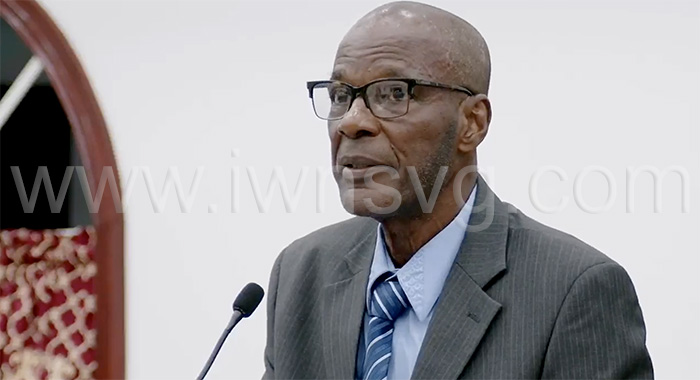A lawmaker has blasted telecom companies for sending bill reminder messages even as their services were offline after the passage of Hurricane Beryl on July 1.
“With respect to the telecommunications providers in the country, I don’t know, but I’m wondering whether the decision-makers from these companies have lost the human touch,” West Kingstown MP Daniel Cummings said in Parliament on Thursday.
“I was severely offended when in all of the struggles to get electricity, telephone and internet, I kept getting text messages about how much I owe the utilities,” he said.
(Please click here to subscribe to the iWitness News WhatsApp channel)
Electricity and telephone services were knocked offline in many parts of St. Vincent during the passage of the hurricane.
In Mayreau and Union Island in the Southern Grenadines, the electricity service remains offline and could remain that way for several weeks more, while in Canouan, power has been returned to a small part of the island.
Cummings said he knows that bill payment messages are automated but said that the management of utility companies could take steps to turn them off after a natural disaster.
“It’s offensive in the least, insensitive in the extreme, and clearly enough is not being done by some of these companies to appreciate the changed environment in which we live,” said Cummings, a former manager of the Central Water and Sewerage Authority.
“It’s not a luxury to have an Internet service. It’s a requirement. A lot of people’s livelihoods depend on an internet service. Communication is a vital part of our being, and I don’t think, honestly, that they, some of them appreciate.”
However, Cummings went on to “congratulate at least one of them that after the fact they sent a notice to say that they will do some reduction on the bill. … obviously, they’re considering the wrongs that they have done.”
He further congratulated the staff of VINLEC, the electricity company, saying, “I have seen for myself the conditions under which people work — at nights in hazardous conditions, going around, checking every pole, doing their best to get electricity back. They, too, understand how important electricity is”.
Cummings, however, said he did not understand why VINLEC did not avail itself of the use of members of Caribbean Electric Utility Services Corporation to help restore electricity faster.
“Clearly, the problems were one of manpower. They simply had to physically go and check this and do this and it is a common practice among utilities, both water and electricity in the region, to share their human resource at exact times like these.”
He said that despite the calibre and number of workmen at VINLEC, electricity in many areas could have been restored fast enough.
“And a lot of food items could have been saved if there was additional support from the regional utilities en masse to resolve the problems required …”
He said that by and large, the generation facilities in St. Vincent remained intact but the limiting factor was the transmission and distribution mains.
“So additional manpower in the early period would have certainly helped. I don’t know what are the reasons why they didn’t. I have absolute respect for the management of VINLEC and the water and sewage authority,” Cummings said.






